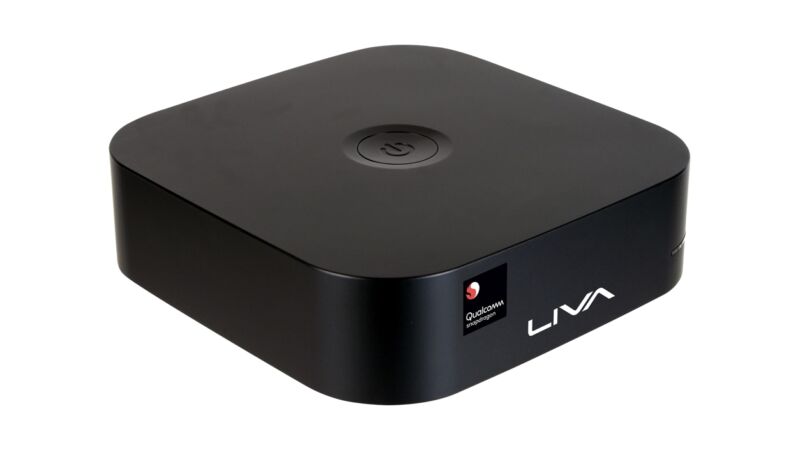
Developers interested in testing out the ARM versions of Windows haven't had much flexibility when it comes to testing hardware. On one end of the spectrum are $1,000-ish tablets like the Surface Pro X, which, especially for indie developers, is a lot of cash to drop just to dabble in a new hardware ecosystem. And while you can technically run Windows 10 and 11 on a Raspberry Pi 4, performance even on a 4 GB or 8 GB Pi leaves a lot to be desired (it's also not actually permitted by Windows' licensing restrictions).
But there's now a solution to this problem in the form of the ECS LIVA QC710, an unassuming Qualcomm Snapdragon-powered Windows mini PC that is currently available in the Microsoft Store for a relatively reasonable $219. The box ships with the ARM version of Windows 10 Home, and at 1.38×4.69×4.59 inches is comparable in size to a set-top box like the Apple TV.
-
One of the QC710's USB ports and its microSD card slot are located on its side.ECS
-
On the back you get a USB-C port that's used to provide power, plus another USB-A port, an HDMI port, and a 100 Mbps Ethernet port.ECS
The low price is reflected in the computer's specifications. It includes just 4 GB of RAM and 64 GB of (presumable eMMC) storage, expandable only via a microSD slot on the side. The Snapdragon 7c chip is also a step down from the Snapdragon 8c, 8cx, SQ1, and SQ2 chips that power tablets like the Surface Pro X. The SoC includes a pair of "big" Kryo 468 Gold cores and six "little" Kryo 468 Silver cores, plus an Adreno 618 GPU, 802.11ac Wi-Fi, and Bluetooth 5 support. Connectivity is limited to a single 5 Gbps USB Type-A port, one USB 2.0 port, an HDMI port, and a 100 Mbps Ethernet port, plus a USB-C port that's used for power.
if those specs aren't enough to dissuade you from considering the QC710 as your next tiny desktop PC, the Microsoft Store's return policy will do it for you: Microsoft explicitly states that it won't give out refunds for the QC710 and that it's "meant for developers, not consumers." Imperfect as it is, for developers aiming to release native ARM builds of their software or write ARM Windows-compatible drivers for their hardware, the QC710 provides an affordable and officially supported way to give the non-x86 versions of Windows a spin.
Ars Technica may earn compensation for sales from links on this post through affiliate programs.
reader comments
100